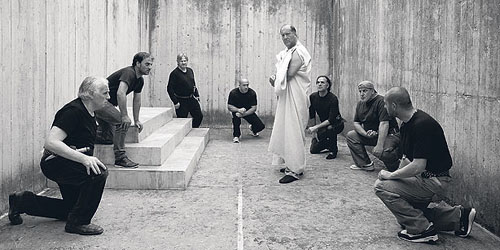Berlin’s Golden Bear
Written by: FFT Webmaster | February 21st, 2012
It was certainly not a foregone conclusion that the docudrama CAESAR MUST DIE, the latest film from veteran Italian directors Paolo and Vittorio Taviani, would be a big hit at the recently concluded Berlin International Film Festival. Berlin often has showcased new, sometimes decidedly weak, films from European filmmakers whose glory has long since passed. However, in this case, the film about prisoners performing Shakespeare impressed the jury enough to win it the Golden Bear, the Festival’s highest honor. Acknowledged for their 1980s and 1990s hits PADRE PADRONE, THE NIGHT OF SAN LORENZO, KAOS and GOOD MORNING BABYLON, the Tavianis, both in their mid-80s, have long been out of favor.

CAESAR MUST DIE is their most satisfying work since their heyday nearly 25 years ago. It takes a simple idea – following the preparations for a stage performance of Shakespeare’s JULIUS CAESAR by a group of inmates at the Rebibbia maximum security prison outside of Rome – from which it mines an impressive variety of riches. Beginning with the end of the triumphant performance, and then flashing back to the start of casting and rehearsals, the film, in a mere 76 minutes, explores the complex relationship between life and art. The actors, hard-boiled Mafiosi types serving life sentences for murder or drug crimes, are extremely candid in their comments on how the plays feels relevant to their own experiences of loyalty, rivalry, violence, loss and redemption. While some of the action is clearly scripted, the film offers an intriguing mix of reality and artifice, which operates on several levels at once, always opening up new strands of meaning and relevance.
It is no misstep that the play’s heart of betrayal and power struggles is made to reflect not only on the dynamics of the prison population but on contemporary Italian politics. As the age of Berlusconi drifts into history and a more austere Italy must face up to its internal corruption and lack of forward-thinking energy, the film offers a rich tapestry in keeping with the Tavianis’ previous themes of failed idealism, communal action and the value of a commitment to art and heritage. As one inmate confides in a revelatory moment after returning to his routine prison existence after the exhilaration of performing in the play, “Ever since I discovered art, this cell has truly become a prison.” In this sense, art not only elevates but also decimates, which is very much a subtext of all the Taviani Brothers’ great films, of which this latest deserves an honored place.


